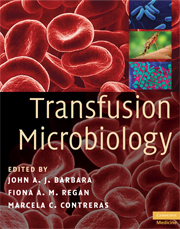Book contents
- Frontmatter
- Contents
- List of contributors
- Foreword
- Preface
- Acknowledgements
- Glossary
- Introduction: Transfusion-transmitted infections, then and now
- Section 1 Agents
- Section 2 Selection and testing
- Section 3 Surveillance, risk and regulation
- 21 Serious hazards of transfusion (SHOT); haemovigilance
- 22 Investigation of post-transfusion infection
- 23 Notification of donors with significant microbiological test results
- 24 Researching the natural history of transfusion-transmitted infections: the UK hepatitis C (HCV) national register
- 25 How to assess risk: prospective studies and calculations
- 26 Risk management
- 27 The regulatory environment in Europe
- 28 Blood safety in developing countries
- Index
- Plate section
- References
23 - Notification of donors with significant microbiological test results
from Section 3 - Surveillance, risk and regulation
Published online by Cambridge University Press: 12 January 2010
- Frontmatter
- Contents
- List of contributors
- Foreword
- Preface
- Acknowledgements
- Glossary
- Introduction: Transfusion-transmitted infections, then and now
- Section 1 Agents
- Section 2 Selection and testing
- Section 3 Surveillance, risk and regulation
- 21 Serious hazards of transfusion (SHOT); haemovigilance
- 22 Investigation of post-transfusion infection
- 23 Notification of donors with significant microbiological test results
- 24 Researching the natural history of transfusion-transmitted infections: the UK hepatitis C (HCV) national register
- 25 How to assess risk: prospective studies and calculations
- 26 Risk management
- 27 The regulatory environment in Europe
- 28 Blood safety in developing countries
- Index
- Plate section
- References
Summary
This chapter describes the notification of confirmed positive, indeterminate and false-positive microbiological test results to donors and the circumstances and objectives of the subsequent discussion. We have based our chapters on extensive experience and describe examples of arrangements in England.
Introduction
The procedures described in this chapter have been developed over many years. Historically, notification of donors with significant test results began within the National Blood Service (NBS) in the early 1970s with the introduction of routine screening for hepatitis B virus (HBV).
The introduction of screening tests for antibody to human immunodeficiency virus (HIV) throughout the UK in October 1985 initiated a more formal approach to ‘donor counselling’, and the NBS, which covers England and North Wales, now has national formal standard procedures for donor notification. The role and value of HIV counselling consultation meetings, which began in 1985, and which have now been widened to include discussion of issues relating to other microbiological markers, has also been recognized (Miller et al., 1989).
In addition, as part of the National Health Service, the NBS has excellent links with hospital clinicians and general practitioners, which facilitates donor referral to specialist services. Within England there are 12 blood centres which deal in an average year with 200–300 confirmed infections out of approximately 2 to 2.25 million blood donations (see Table 23.1).
The majority of these infections will be detected in first-time blood donors.
- Type
- Chapter
- Information
- Transfusion Microbiology , pp. 317 - 322Publisher: Cambridge University PressPrint publication year: 2008



